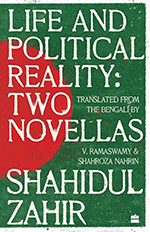The written word is a silent medium—we can only see the words on the pages of a book, cannot hear their sounds. We create those sounds in our minds while reading the book. As we slowly move from one word to another, one sentence to another, one paragraph to another, we gradually grow accustomed to listening to the words in our mind. Loud, shrill, gruffy, with different accents—we assign voices to characters, and sounds that we have created while reading assume texture. Shahidul Zahir disturbs this sequence. In both his novellas Life and Political Reality and Abu Ibrahim’s Death, published together as Life and Political Reality: Two Novellas, Zahir tells his reader what to hear. Starting with the phot sound of snapping of Abdul Mojid’s sandal, the reader learns about Lakshmi Bazar, a small neighbourhood in East Pakistan in 1971 and the rampage of razakars (a voluntary paramilitary force working for then West Pakistani army) through sounds:
That was when, within the noise and chaos of the crowds and vehicles of Nawabpur Road, he perceived something more. Going beyond the sounds that men and vehicles make to which men are not always alert, he entered the sphere of a tinnitus…
The repeated textualizations of sounds—cries, dead bodies being flung aside, gunshots, speakers, microphones—not only showcase the merciless power of the gun as a device, but also highlight the complete lack of sympathy that defines the ordinary life of Bangladesh.

